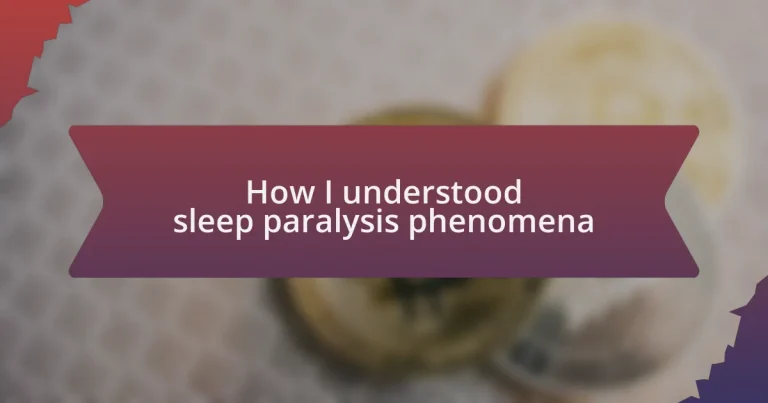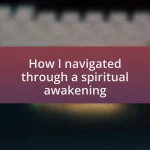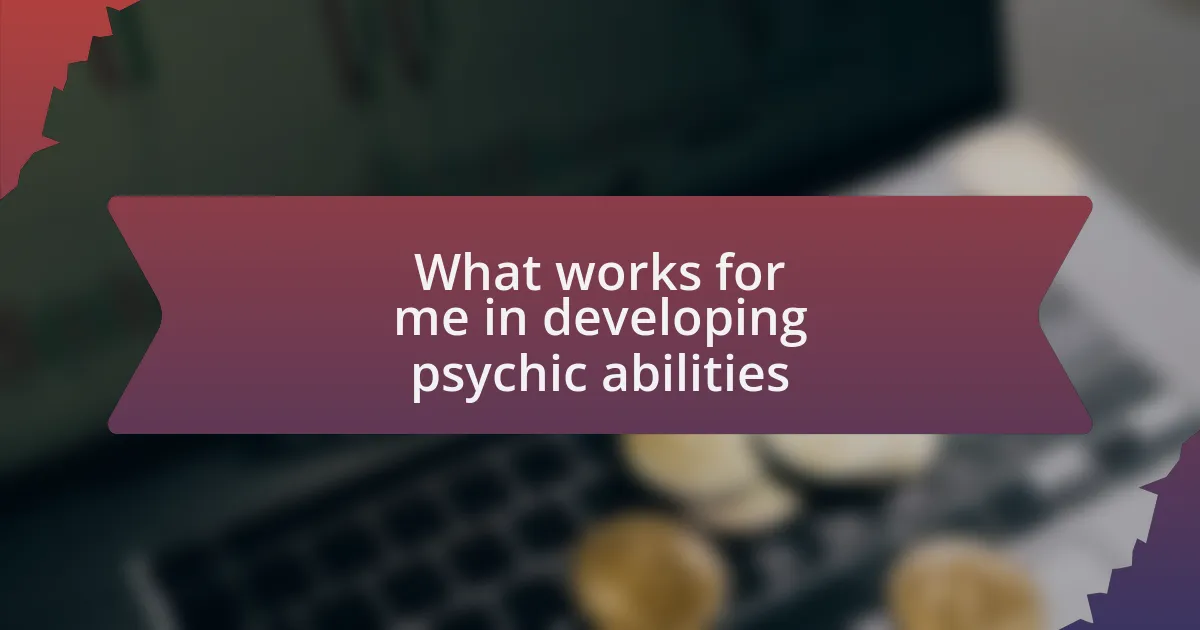Key takeaways:
- Sleep paralysis occurs during the REM stage of sleep, leading to a state where the mind is active but the body is immobile, often accompanied by vivid hallucinations.
- Various cultures interpret sleep paralysis differently, often attributing it to supernatural experiences, highlighting the connection between personal beliefs and these episodes.
- Common symptoms include a sensation of intense pressure, auditory hallucinations, and visual disturbances, leading to confusion about reality during episodes.
- Many myths about sleep paralysis exist, including misconceptions about its rarity and its relation to demons, emphasizing the need for a better understanding of the phenomenon.
Author: Evelyn Hartman
Bio: Evelyn Hartman is a contemporary author known for her evocative storytelling and rich character development. With a background in psychology, she weaves intricate narratives that explore the complexities of human relationships and personal growth. Her debut novel, “Whispers in the Wind,” garnered critical acclaim and established her as a powerful voice in modern literature. Evelyn resides in the Pacific Northwest, where she draws inspiration from the vibrant landscapes and diverse communities around her. When she’s not writing, she enjoys hiking, gardening, and spending time with her two rescue dogs.
Understanding sleep paralysis
Sleep paralysis can be a bewildering experience, leaving you feeling trapped in your own body. I remember the first time it happened to me; I was overwhelmed with a blend of terror and confusion. What’s intriguing about sleep paralysis is how it often coincides with vivid hallucinations. Have you ever felt a weight on your chest or seen shadowy figures lurking in the corners of your room? It’s both frightening and fascinating how our minds can conjure such vivid imagery during a state of paralysis.
Diving deeper into this phenomenon, I discovered that sleep paralysis occurs during the transition between wakefulness and sleep. It made me rethink how fragile our perception of reality can be. I often wondered why I felt such immense fear during these episodes when intellectually, I knew I was safe. It highlights the complexity of our mind and body connection; in those moments, fear isn’t just a mental state but a visceral reaction.
Interestingly, many cultures interpret sleep paralysis through various lenses, often attributing it to supernatural causes. I’ve spoken with others who believe these experiences are encounters with otherworldly entities. How much of it is shaped by societal beliefs and personal biases? By reflecting on personal experiences, it becomes clear that understanding sleep paralysis is not just about physiological factors but also about tapping into the emotional and cultural narratives that shape our approach to these eerie episodes.
The science behind sleep paralysis
When discussing the science behind sleep paralysis, it’s fascinating to note that it primarily occurs during the rapid eye movement (REM) stage of sleep. During this phase, our brains are highly active, yet our bodies enter a kind of paralysis to prevent us from acting out our dreams. I can’t help but wonder how many people realize this mechanism is a protective measure. It’s a stark reminder of how our brain, while engaging in fantastical visions, ensures our bodies stay still—an odd yet clever safety feature, isn’t it?
It’s also worth mentioning that a lack of sleep or irregular sleep patterns can increase the likelihood of experiencing sleep paralysis. When I had my most intense episodes, I was often stressed and had been burning the candle at both ends. Have you noticed how sleep deprivation leaves you more vulnerable to anxiety and strange experiences? This connection between mental state and sleep disturbances emphasizes the need for self-care and a regular sleep schedule, something I’ve learned to prioritize since my encounters.
Research has shown a link between sleep paralysis and certain sleep disorders, such as narcolepsy. I once discussed my experiences with someone who had narcolepsy, and they shared their perspective about how sleep paralysis felt different for them. It made me reflect on how personal experiences can vary widely based on individual circumstances. Isn’t it intriguing how one phenomenon can manifest in such unique ways for different people? Understanding these variations is crucial in demystifying sleep paralysis and fostering a deeper comprehension of our sleep experiences.
Common experiences during sleep paralysis
Many people report feeling a heavy weight on their chest during sleep paralysis, often describing it as an intense pressure. I vividly recall one night, unable to move or call out, feeling as if a dark figure was pressing down on me. It’s terrifying, right? Imagining being utterly helpless while your mind races, grappling with fear and confusion.
Another common experience involves auditory hallucinations, where sounds like whispering or footsteps seem unnervingly real. I remember lying in bed, straining to decipher whether the noises were real or products of my stressed mind. It made me question the very fabric of reality during those moments. Have you ever wondered how easily our senses can be tricked when we’re caught between sleeping and waking?
Some individuals also perceive vivid visual hallucinations, which can range from benign to outright nightmarish. In my case, I’ve encountered shadowy figures dancing just out of sight, instilling a profound sense of dread. It makes me ponder how the mind’s creativity doesn’t rest even when our bodies are ‘asleep.’ Isn’t it fascinating—and also a bit unsettling—how our dreams can blend with our waking fears during these episodes?
Exploring sleep paralysis myths
While discussing sleep paralysis, many myths surface that can distort our understanding of the phenomenon. One prevalent myth is the belief that sleep paralysis is a sign of demonic possession or a supernatural attack. I once thought this myself, feeling a shiver run down my spine as I lay frozen in my bed. Now, I view it through a different lens, recognizing that these episodes are rooted in sleep disorders rather than dark forces.
Another common misconception is that sleep paralysis only happens to people who are sleep-deprived or overly stressed. From my experience, I can attest that even those with healthy sleep patterns can encounter it. I remember a time after a restful week, yet I still faced the sudden grip of paralysis one night. Isn’t it interesting how our bodies can still play tricks on us, regardless of our overall well-being?
There’s also the myth that experiencing sleep paralysis is rare. In truth, a significant portion of the population has faced it at least once in their lives. I recall speaking with friends who shared similar experiences, sparking a dialogue about the seemingly shared reality of these episodes. It’s a reminder that sometimes, what feels isolating is actually a common thread of human experience, inviting us to explore it further together.





